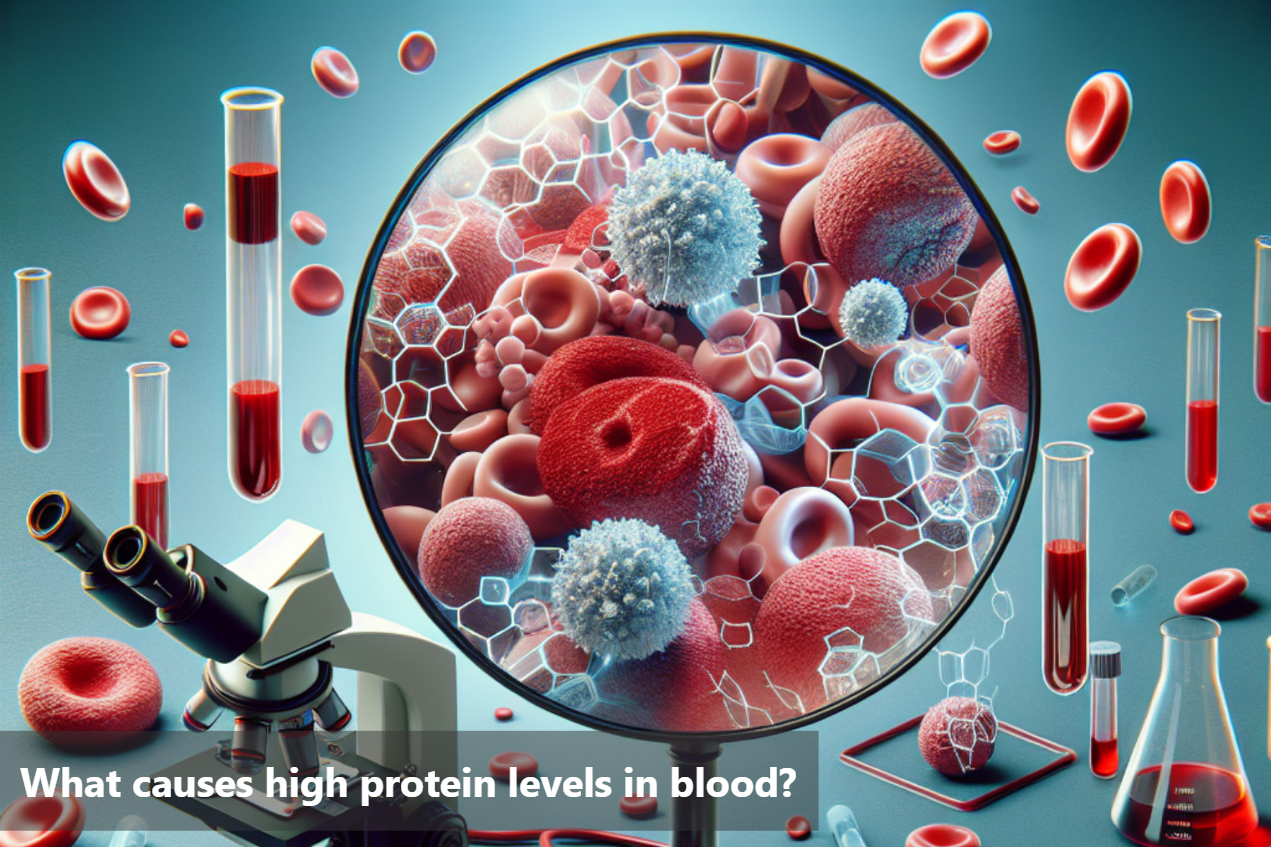
What causes high protein levels in blood?
Proteins play a crucial role in maintaining overall health, with their presence in the blood being a key indicator of various bodily functions. These protein molecules serve diverse functions, from transporting essential nutrients to supporting the immune system. Understanding the significance of protein levels in the blood can provide valuable insights into one's health status.
The blood contains a variety of proteins, such as albumin, globulins, and fibrinogen, each serving specific functions vital for our well-being. Monitoring the levels of these proteins is essential for assessing nutritional status, liver and kidney function, and immune system health.
Furthermore, high protein levels in the blood can indicate underlying health conditions that need attention. Factors like dehydration, chronic inflammation, infections, and certain illnesses can contribute to elevated protein levels. Recognizing these causes is crucial for prompt diagnosis and treatment, highlighting the importance of regular health check-ups. Prioritizing a balanced lifestyle and seeking medical guidance can help in managing protein levels and promoting overall well-being.

Normal Levels of Protein in Blood
Total Protein: Normal levels of total protein in blood typically range between 6.0 to 8.3 grams per deciliter (g/dL) or 60 to 83 grams per liter (g/L).
Albumin: The normal range for serum albumin, the most abundant protein in blood, is usually between 3.5 to 5.0 g/dL or 35 to 50 g/L.
Globulin: The reference range for serum globulin, which includes various proteins like immunoglobulins and transport proteins, is typically between 2.0 to 3.5 g/dL or 20 to 35 g/L.
Albumin-to-Globulin (A/G) Ratio: A healthy A/G ratio falls within the range of 1.0 to 2.2, with albumin levels usually higher than globulin levels.
Serum Protein Electrophoresis (SPEP): This test separates proteins in the blood into distinct fractions, including albumin, alpha-1 globulins, alpha-2 globulins, beta globulins, and gamma globulins, each with its normal range.
Causes of High Protein Levels in Blood
Dehydration: Insufficient fluid intake can lead to higher concentrations of protein in the blood.
Infections: Certain infections, such as bacterial or viral infections, can cause an increase in blood protein levels as the body produces more antibodies.
Inflammatory Conditions: Chronic inflammatory conditions like rheumatoid arthritis or lupus can elevate blood protein levels due to increased immune activity.
Liver Disease: Liver damage or dysfunction can impair the liver's ability to regulate protein synthesis and metabolism, leading to elevated blood protein levels.
Kidney Disease: Kidney disorders can result in proteinuria, the presence of excessive protein in the urine, which may lead to higher protein levels in the blood.
Multiple Myeloma: This type of cancer affects plasma cells in the bone marrow, leading to the overproduction of abnormal proteins, which can elevate blood protein levels.
Treatment and Management
Identifying the Underlying Cause: Diagnosing and addressing the underlying condition causing elevated protein levels is crucial for effective management.
Treating Underlying Conditions: Treatment may vary depending on the specific cause, such as infections, inflammatory disorders, liver or kidney disease, or certain cancers.
Lifestyle Modifications: Adopting a healthy lifestyle, including regular exercise, balanced diet, and adequate hydration, can support overall health and may help manage underlying conditions contributing to high protein levels.
Medications: Depending on the underlying cause, medications such as antibiotics for infections, anti-inflammatory drugs for inflammatory conditions, or medications to manage kidney or liver disease may be prescribed.
Dietary Changes: In some cases, dietary modifications, such as reducing intake of protein-rich foods, may be recommended to help lower blood protein levels.
Consultation with Specialists: Depending on the underlying condition, consultation with specialists such as nephrologists, hepatologists, oncologists, or rheumatologists may be necessary for comprehensive management.

Common Causes of Elevated Protein Levels in the Blood
Understanding the factors that contribute to high protein levels in the blood is crucial for maintaining good health. It is essential to recognize the symptoms and seek medical advice promptly for a comprehensive diagnosis and appropriate treatment.
High protein levels in the blood can indicate underlying health concerns that should not be ignored. Therefore, consulting healthcare professionals for accurate assessments and tailored management strategies is vital.
Remember, early detection and intervention are key to preventing complications associated with high protein levels in the blood. Always prioritize your health and well-being by taking proactive steps to address any abnormalities promptly.
FAQs
-
What are the common causes of high protein levels in blood?
Some common causes of high protein levels in blood include dehydration, liver disease, kidney disease, chronic inflammation, and certain types of cancers.
-
How can dehydration lead to high protein levels in the blood?
Dehydration can cause blood proteins to become more concentrated, resulting in higher levels of protein in the blood.
-
Is high protein in the blood always a cause for concern?
High protein levels in the blood may not always be a sign of a serious condition. It is important to consult with a healthcare provider for proper evaluation and diagnosis.
-
Can certain medications contribute to high blood protein levels?
Yes, certain medications like corticosteroids or hormone therapies can sometimes lead to elevated protein levels in the blood.
-
What lifestyle changes can help lower high protein levels in the blood?
Maintaining a balanced diet, staying hydrated, regular exercise, and avoiding excessive alcohol consumption can help in managing high protein levels in the blood.
This Blog post is an initiative by Lo! Foods, to provide accurate and Nutritionist / Doctor approved information related to Health. Lo! Foods is India's leading brand for Everyday Functional Foods. Foods designed for specific Health conditions or Needs. Lo! Foods also runs India's largest range of Low Carb Healthy Cloud Kitchens, under the brand names of Lo!, ProteinChef, ATH (All Things Healthy) and DiabeSmart.











Leave a comment
Your email address will not be published.